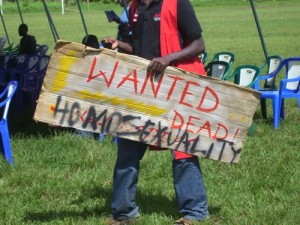The PR folks of my home institution are happy when the university’s name comes up in the national news. However, the story recently on NPR, in which Virginia Commonwealth University was mentioned, may not be the publicity they seek. The story was about the death of a local character who hung out near the university. This was Donnie Corker, better known as Dirt Woman, a well-known transvestite who engaged in a wide variety of public activities, from selling flowers on Grace Street to crashing the Inaugural of Governor Doug Wilder. He was notably involved in a variety of charity endeavors. He was out as a transvestite at a time when that was not an easy thing to do, and his popularity encouraged others to come out. In the NPR story, transgender Ellen Shaver talked about how important Dirt Woman had been for her:
Here it was. He was already 200-and-something pounds, and he was out there dressing the part and getting away with it. As far as I could go was probably the perimeters of my house. And Donnie was down there parading up and down Grace Street acting like, who cares?
I remember Dirt Woman well, as he appeared in the 1970’s and 1980’s, sitting on a stool selling flowers, an unusual figure, but harmless, friendly, and always upbeat. His haunt, Grace Street, has changed a lot since then, as the university has transformed a porno theater into a fine arts venue and bought out former sketchy bars, stripjoints, and nightclubs. Our original German conversation group, the Richmond Stammtisch (now meeting Thursday evenings at Mojos) started with a small group meeting at McClean’s at the corner of Grace and Shafer Sts. (where VCU GLOBE is now). In fact, in the very first Stammtisch in 1980, I met for the first (and only) time, the colleague in the Foreign Language Department whom I was hired to replace, Gerhard Kallienke. He had been sitting at a table nearby and overheard us speaking German and came over afterwards to introduce himself (and trash all his former colleagues). Soon afterwards, he moved to Oklahoma, where, according to The Oklohoman, he was murdered in the early 1990’s in a gruesome case which involved teenage girls having “taunted Kallienke by pouring coffee, sugar, flour and shaving cream on his body as he lay naked in a drunken stupor” and then dousing him and his room with gasoline before setting fire to the building. The girls allegedly had “traded sexual favors for money after he hired them to clean his house” and then forged and cashed his checks.
Now that’s a situation which I’m sure VCU was happy to have happened after Kallienke was far away from Richmond and no longer associated with the university. Dirt Woman may not have been an academic, or had a conventional lifestyle, but he was nonetheless someone who had an inspiring influence and not a person we should regret having had a close connection to the university.

